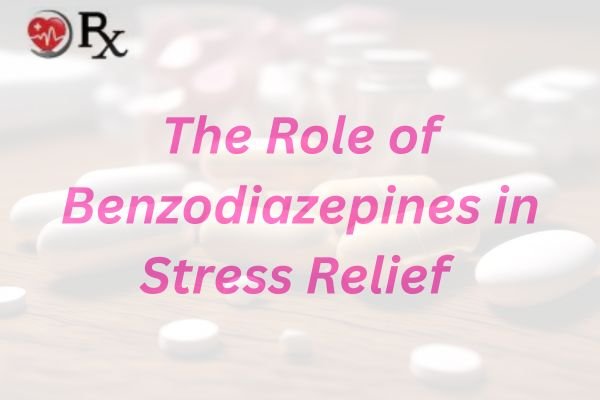
Stress is an inescapable part of life, and millions of people around the world suffer from stress-related disorders like anxiety, insomnia, and panic attacks. To treat these symptoms, healthcare providers usually prescribe medications, and among the most commonly prescribed are benzodiazepines. These drugs, which include well-known names like Valium, Xanax, and Ativan, are effective in managing short-term stress and anxiety. However, their potential for dependency and long-term health risks has raised concerns. In this blog, we’ll explore the role of benzodiazepines in stress relief and the potential for dependency.
What Are Benzodiazepines?

Benzodiazepines are a class of drugs that affect the central nervous system. They enhance the effect of gamma-aminobutyric acid (GABA), which is a neurotransmitter with an inhibitory effect on the brain, reducing feelings of anxiety, promoting relaxation, and inducing sleep. Benzodiazepines are used in the treatment of anxiety disorders, panic attacks, insomnia, and acute stress response.
They are quick to provide relief through the reduction of symptoms associated with stress, hence very popular among those who need relief quickly from overwhelming emotions.
How Benzodiazepines Work to Relieve Stress
If there is an anxiety or any heighted emotional condition caused by the resultant stressful condition, then the nervous activity becomes heightened. The increased GABA effect that tranquilizes the nerves can be boosted by benzodiazepines. They reduce this heightened activity and create relaxation. Therefore, they find excellent application in the therapy of acute anxiety or acute insomnia.

Advantages in Benzodiazepine Therapy for Stress Relief
1.Rapid Effectiveness: One of the key reasons benzodiazepines are prescribed is their ability to provide immediate relief. Users often feel the calming effects within 15 to 30 minutes, which is ideal for those experiencing acute stress or anxiety.
2.Improved Sleep: Benzodiazepines can help individuals suffering from insomnia caused by stress or anxiety. By promoting relaxation and reducing anxiety, these medications often allow people to get the rest they desperately need.
3.Short-term Solution: For example, those individuals under situational stress who experienced traumatic events in the past or temporary anxiety/acute stress reactions find benzodiazepines very effective to temporarily prevent stress from increasing the mental and emotional toll of that situation.
While benzodiazepines are useful for short-term stress relief, the potential for dependency and addiction is a significant concern. The effects of these medications can create a feeling of relief that some people begin to rely on. Over time, the brain may become accustomed to the drug’s effects, leading to increased tolerance and the need for higher doses to achieve the same level of relief.
- Tolerance and Withdrawal
As the body becomes accustomed to benzodiazepines, the users may require higher doses to get the same effect, which is known as tolerance. This tolerance may lead to a higher risk of developing dependence. If a person tries to quit benzodiazepines, they may experience withdrawal symptoms, which can be very severe and include:
- Anxiety
- Seizures
- Muscle cramps
- Insomnia
- Panic attacks
- Cognitive and Emotional Impact
Long-term use of benzodiazepines can also cause cognitive impairment, including memory impairment, decreased concentration, and poor judgment. These side effects may further increase stress over time, as individuals become dependent on the medication to treat not only the initial stress but also the new stress caused by the drug’s cognitive effects. - Physical Dependence and Addiction
The most significant dangers that long-term benzodiazepine use poses are those of becoming physically dependent on them, which may lead to addiction. Those who develop dependence would find it extremely challenging to function without it; upon trying to abstain, they experience both psychological and emotional distress.
The Healthy Way of Stress Management – Benzodiazepines

Now that benzodiazepine is identified as a potential addiction tool, other ways to relieve stress that are not medicine-dependent need to be identified. Here are some stress management alternatives:
1.Cognitive Behavioral Therapy (CBT): CBT helps patients learn the thought patterns contributing to anxiety and stress and tools to change these thought patterns in a healthy manner.
2.Mindfulness and Meditation: Mindfulness meditation can be used to better understand one’s stress trigger and how to react calmly in a measured way to stressors.
3.Exercise: Probably the most effective method in reducing stress, improving moods, and enhancing mental health is regular exercise.
4.Breathing Exercises: Activation of the relaxation response with deep breathing techniques helps counteract the physiological manifestations of stress.
Conclusion
These provide quick and effective solutions for short-term stress and anxiety, but the potential for dependency and the side effects of long-term use cannot be overlooked. While they can change the lives of people who need immediate relief, caution must be exercised, and use should be under a healthcare provider’s guidance. Other alternative therapies include therapy, exercise, and mindfulness, which may be useful for attaining long-term relief without the risk of dependency associated with benzodiazepines.
If you decide to take benzodiazepines, you must consider the pros and cons of the treatment in comparison with other options, so it is important to talk to a healthcare professional to see what will work best for you.








Leave a Reply